When you purchase through links on our site, we may earn an affiliate commission. Learn more...
Lenovo vs Dell vs HP vs ASUS Laptops: The Ultimate Guide
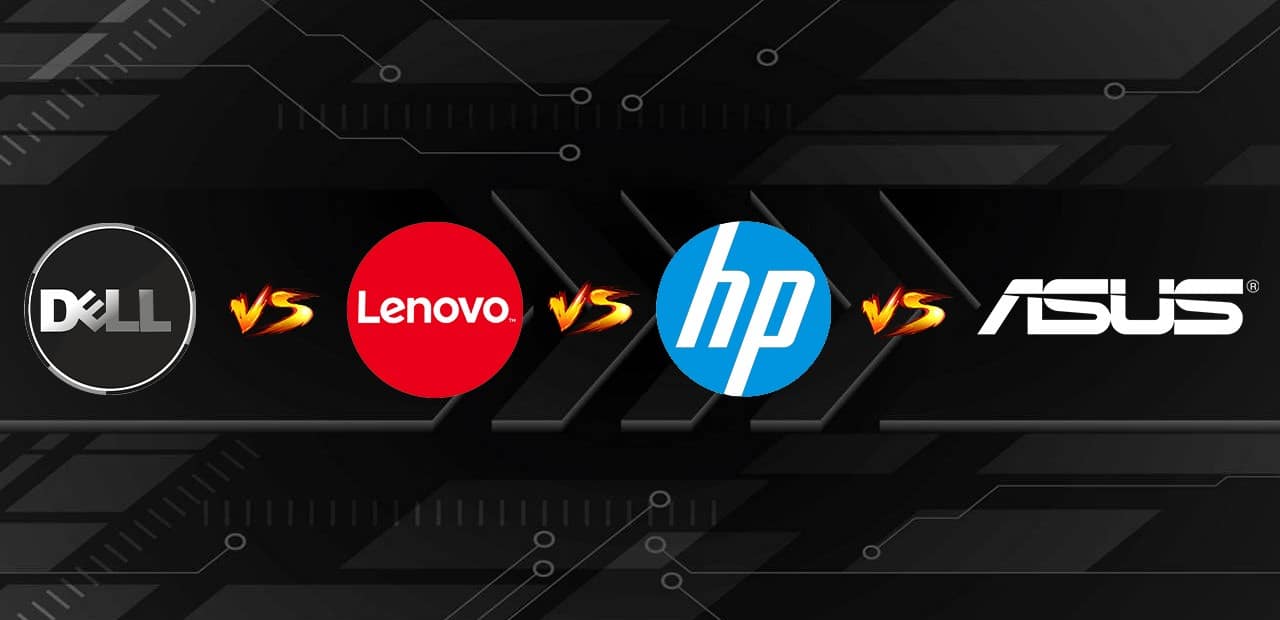
Purchasing a laptop that runs on Windows may seem straightforward, but it's more complicated than it appears. Understanding the wide range of brands and specifications is vital for an informed decision.
There are so many different laptop brands to choose from, which makes the whole process very confusing.
This guide will delve deeply into the advantages and disadvantages of Lenovo, Dell, ASUS, and HP, and give you handy tips to make an informed decision fitting your budget.
Key Takeaways
- Up to $500: If you're looking to spend no more than $500, consider HP or Dell. HP is often a superior choice since they're known for their cost-effective and efficient work laptops.
- Versions with at least 8GB of RAM are recommended, optimal for activities like browsing, Office applications, and Photoshop.
- If you're a casual gamer, Lenovo might be a better fit. Take the Lenovo IdeaPad 3 14IIL05, for example, it handles games like GTA V, League of Legends, DOTA 2, CS:GO satisfactorily.
- Between $750 and $1000: Within this budget, opting for Lenovo is a smart choice unless you stumble upon a better sale deal. Specifically, Lenovo Gaming IdeaPad 3 with 16GB RAM and GeForce RTX 3050 is an excellent pick. There are substitutes at the $750 mark, but they come with a GTX 1650.
- A note to remember, the RTX 3050 doubles the performance in gaming and rendering for just an additional $100. Sounds like a worthwhile investment, right? For something even more high-end, the ASUS TUF series can be yours for around $1000, but always compare the specs before deciding.
- Above $1000: For those ready to invest over $1000 in a laptop, it's critical to ensure it's packed with components that will withstand a decade of use. For this budget, ASUS ROG and Alienware stand at the top.
- I lean towards ROG since they come with a lesser price tag, however, you can find good Alienware deals. Just be sure to meticulously evaluate the specs, warranties, and price to bag the best deal for your needs.
Malfunction Rates
Everyone's primary requirement from a laptop is longevity. After all, who would want to buy a laptop that starts showing signs of wear and tear within its initial years of use? Let's discuss the significance of a laptop's reliability, and tackle common apprehensions about laptop malfunctions.
For that reason, I did thorough research to figure out what the laptop malfunction rates are for every manufacturer. You can see down below the reliability of each brand.
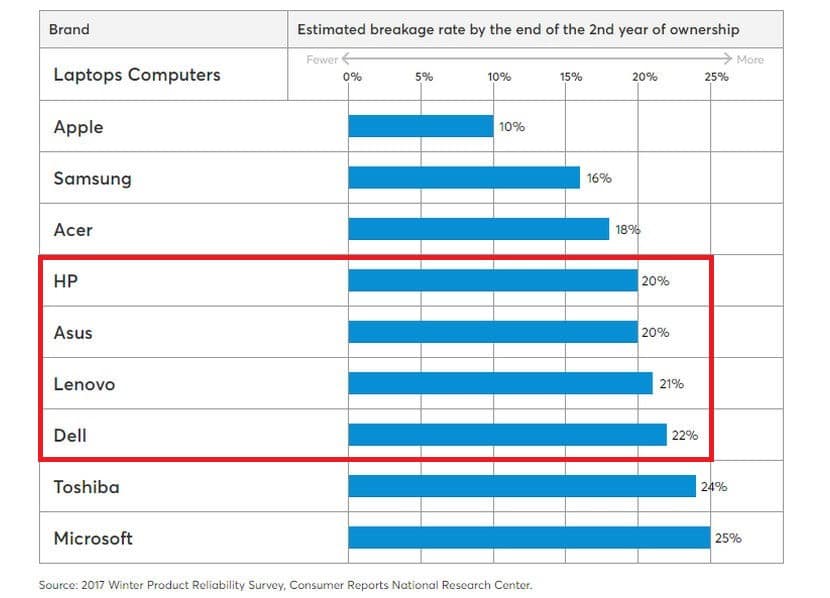
Most reliable laptop brands between Dell, HP, Lenovo, and ASUS
All four laptop brands are almost equally reliable as their estimated breakage rate by the end of the 2nd year of ownership is about 20-22%.
Dell and Lenovo laptops seem to be slightly more durable while HP ones tend to experience motherboard issues which are hard and expensive to repair.
As you can see in the graph, Apple is at the top when it comes to reliability and it’s not even close. This is why I am not even gonna put them in the conversation.
They are in a different league even though they are probably the worst company when it comes to Value for Money laptops. Have in mind that these results are from 2017 so things might have changed a bit.
Lenovo
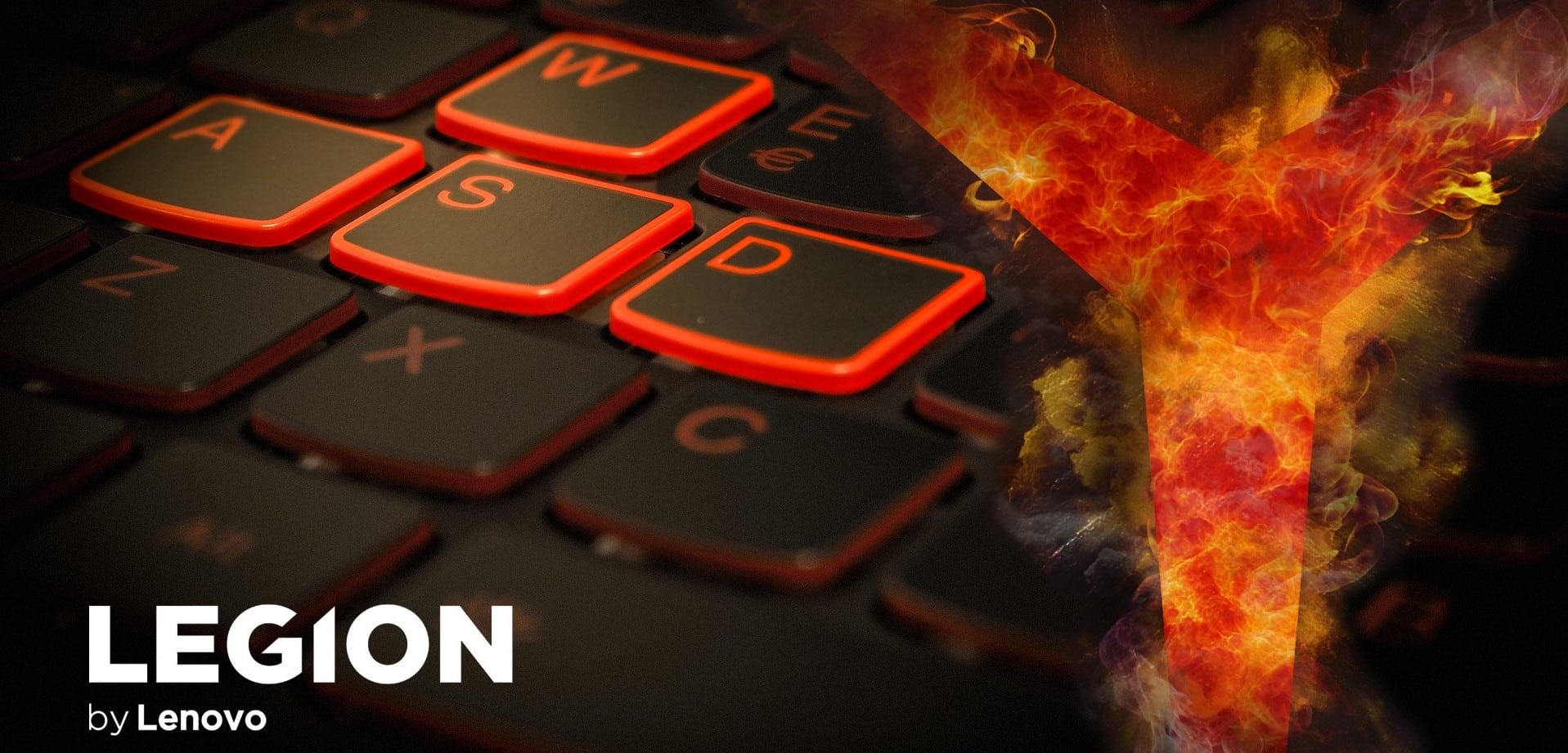
Lenovo laptops, in my opinion, excel in adaptability in terms of the user's budget and functions. They are impeccably suited for various tasks, including business purposes, gaming, coding, or video editing.
In particular, their Ideapad series starts at about $750 with laptops equipped with Core i5/Ryzen 5 and Ryzen 7 processors, 16GB RAM, and a GeForce GTX 1060 graphics card.
They are perfect for people who don’t want to cross the $1000 mark and don’t really need an RTX GPU. Lenovo ThinkPads are also praised as outstanding business laptops because they have very comfortable keyboards and are impressively quiet when operating.
My personal favorite is the Lenovo IdeaPad Gaming 3 15IHU6 which carries a GeForce RTX 3050. Yup, you read correctly, Ray Tracing and DLSS for $850. That’s an absolute steal if you ask me. This can cover your gaming needs for the next 7 years. You can also find their 8GB versions for even less money.
In terms of durability, Lenovo motherboards are known to last more than 10 years. I cannot stress this enough. Motherboards in laptops are the hardest part to repair and most of the time it’s not even worth the money to do so since you’ll just replace it with the same type of malfunctioning hardware.
Lenovo boasts commendable customer service, and out-of-warranty repairs typically don't burn a hole in your pocket.
Now, if you are not on a budget and you want to spend more than $1000, then Lenovo can still be a good pick, but not the absolute best. For instance, the Lenovo Legion 5 series is inferior to Dell’s Alienware and Asus’s ROG series in terms of appearance.
In general, Lenovo laptops are fairly slim and good-looking, but those other brands can offer you laptops with equally strong specs and a much better (multi-colored) appearance.
I am not saying that the Lenovo Legion series doesn’t have gorgeous laptops. It’s just that Alienware and ROG look way better in my opinion! This is all subjective, though, so you could possibly have a different opinion on this matter.
Pros
- Value for money option for people who want to spend no more than $1000.
- Excellent overall quality.
- Very durable.
- Decent customer service.
- Can cover a wide range of budgets.
- Comfortable, slim, and silent design.
Cons
- Lenovo Legion 5 series could have a better appearance.
- Their low-end laptops are slightly overpriced.
- Legion 5 is noisy even when sitting idle compared to other gaming brands.
Dell – Alienware
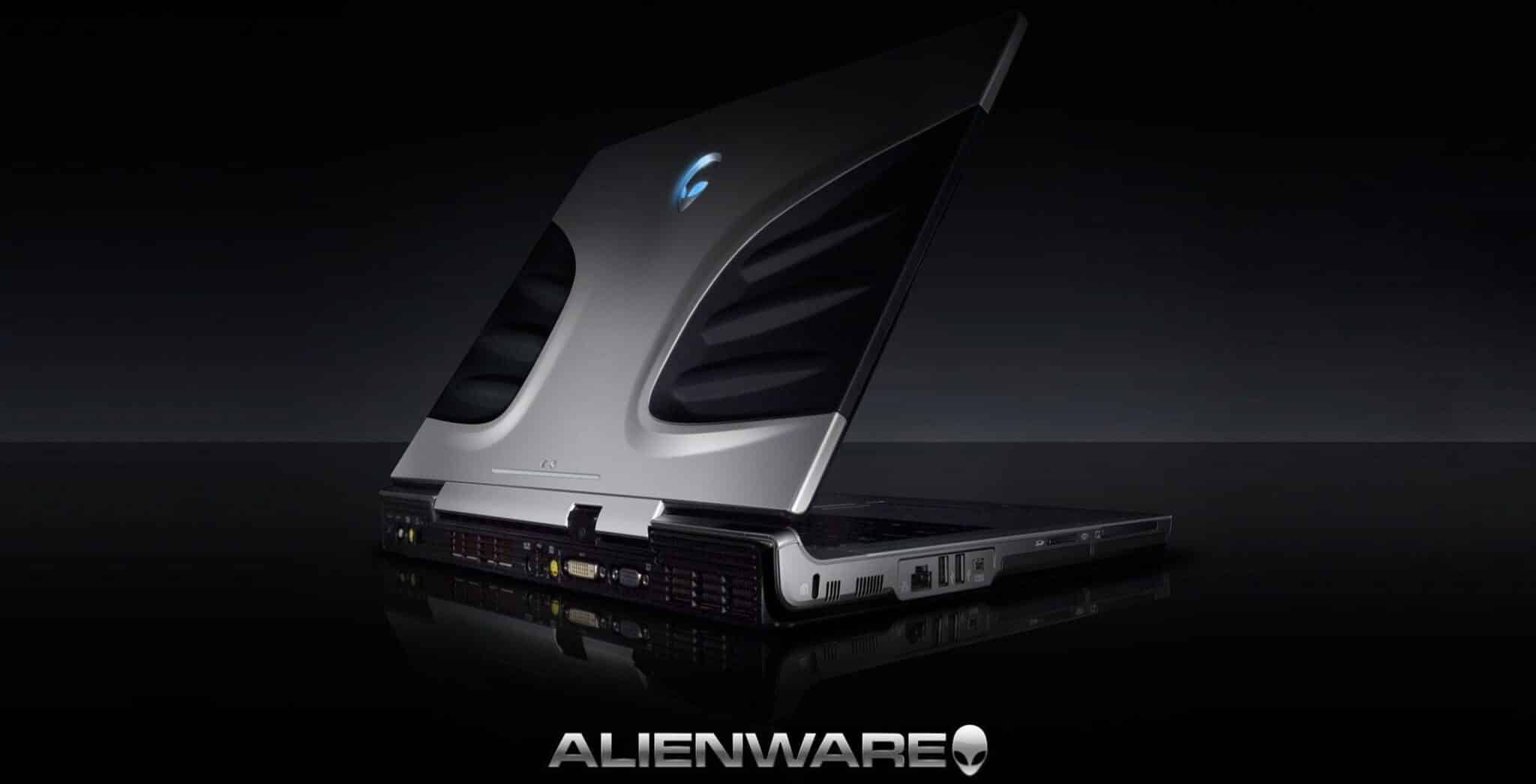
Are you a gamer that doesn’t want to spend more than $900 on a gaming PC? Well, Dell’s G5 series is probably your best bet. I genuinely believe that Dell is in the same boat as Lenovo. Their laptops can cover the needs of every user, from “casual” to “hardcore” ones.
As I previously mentioned, their laptops are very durable and could survive some extra “falls” before breaking. That doesn’t mean that you should carry them with you on your mountain climbing trip.
They probably offer the best mix of performance-reparability and reliability. They get their supply of motherboards from ASUS and let me tell you, they are of the highest quality. We’ll discuss more ASUS in detail down below.
In terms of appearance and performance, Dell’s XPS and especially Alienware take all the praise from consumers. These are high-end machines, though, so don’t expect to buy them for cheap.
And speaking of Alienware, they not only have laptops and desktops that look INSANE but they also have peripherals such as mice, keyboards, headsets, and monitors. They are overpriced but if you have the budget to spend, you can go full Alienware mode.
Additionally, Dell’s customer service is particularly good when it comes to getting guidance from its experts. If your laptop has an issue, they will assist you in finding the problem and you can solve it yourself with some DIY methods.
At last, Dell laptops have impressive battery life and in fact, the Dell Latitude 9510 has the longest-lasting battery life ever. I am talking about 18 hours of continuous surfing on the web.
Pros
- Top Quality.
- Best battery life of all time.
- Exceedingly durable.
- Great customer service experience.
- The Alienware laptops are perfect for gamers.
Cons
- Slightly higher pricing
- More expensive than Lenovo.
- Their Alienware products are extravagant.
ASUS
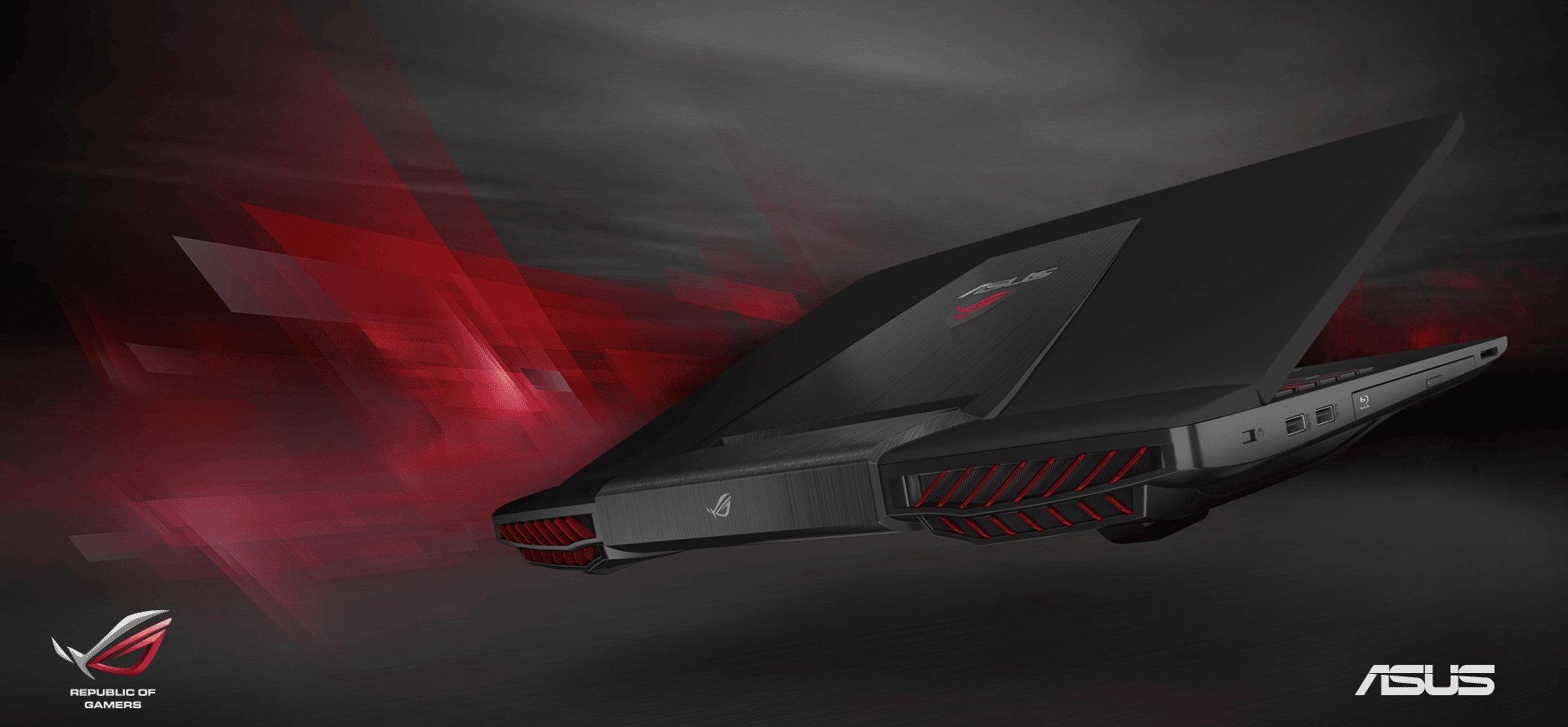
If I were to put a brand on top of the list in terms of reliability alongside Apple MacBooks, I would definitely choose ASUS. Think of it this way; the other brands such as Dell, Lenovo, and HP do not produce any type of PC hardware.
They make monitors, printers, and some peripherals but that’s about it. ASUS on the other hand, makes motherboards, graphics cards, CPU air/liquid coolers, sound cards, and power supplies just to name a few, and started their business by supplying others with their reliable hardware.
Therefore, they are not forced to buy all of their laptop parts from other manufacturers and as a result, they can offer high-quality products at more competitive prices. I am not saying that they are the cheapest but you can see the type of advantage they have over their competitors.
The Republic of Gamers (also known as ROG) series is my favorite thing about ASUS. They started it back in 2006 and they never looked back since then. As the name suggests, these laptops are made for gamers and the series includes some of the finest in terms of appearance, performance, and reliability.
The ROG Strix G15 is the “entry-level” laptop of the series and costs more than $1100. There are even more expensive ones that reach the $4000 price range. Obviously, these can also be used by programmers, VFX editors, and pretty much anyone who can afford them.
Their specs are powerful enough to handle anything. In addition, ASUS has the TUF (The Ultimate Force) series which is pretty similar to ROG but cheaper.
On the negative side, their customer support could definitely get some improvements. You don’t experience problems often but when you do, it gets very confusing and especially if you’re a retail customer.
Their second disadvantage is their pricing. Do you remember at the start of this that I said that you can buy a Lenovo with an RTX 3050 for $850? Well, to buy the same thing from ASUS is gonna cost you about $1000.
Pros
- High-quality laptops.
- ROG specs are unmatched and cheaper than Alienware.
- They produce some of the hardware used in their laptops.
- Futuristic appearance.
- Solid Battery Life.
Cons
- Expensive option
- Customer support for retail customers is below average.
HP
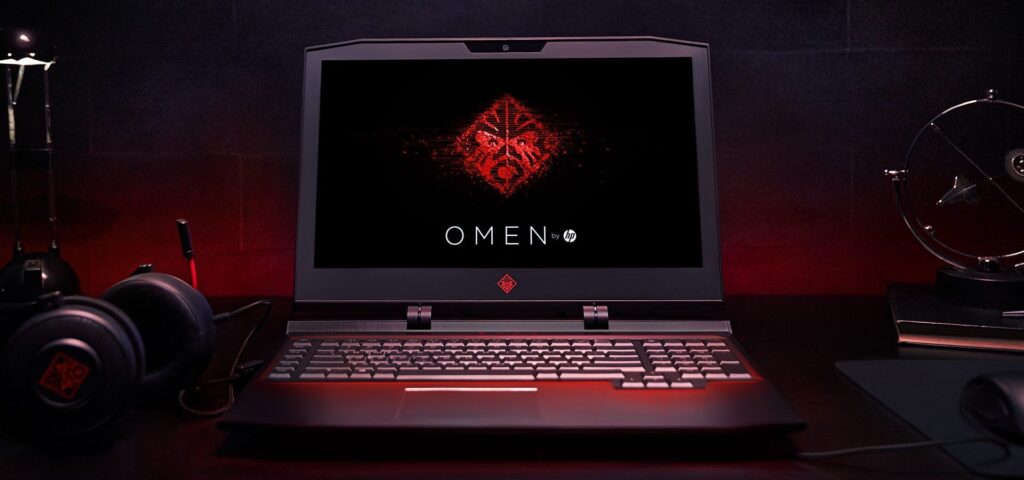
Hewlett-Packard is the oldest brand among these 4, and you would think that this is the go-to option when it comes to reliable laptops, right? Well, it’s a little more complicated than that. HP is indeed the best option when it comes to low-end laptops.
If you combine them with a budget Logitech mouse, then your result will be pretty cost-efficient. It’s no coincidence that their most expensive laptop costs about $2500 and doesn’t even have the best specs for that price.
They generally don’t aim to compete with the likes of Alienware and ROG. Instead, they focus on bringing you excellent value-for-money options in the under $500 category, competent customer support, and great connectivity with their printers and peripherals.
Now, you can guess that all these value-for-money and affordable options come with a few sacrifices.
Whenever an HP laptop fails, it’s most likely the motherboard and if you remember what I told you at the start of this guide; you do not want to face a faulty motherboard since they are the hardest and pricier to replace.
Consequently, the reparability of HP laptops goes down substantially. In addition, their OMEN series are supposed to be high-end gaming machines and while they do have decent specs for their price, their appearance has nothing special to remember.
At last, you might face issues when trying to get in contact with an actual person to resolve an issue. Their virtual assistance is good but sometimes you need to talk to an expert even if it’s through live chat.
Pros
- Affordable and value-for-money options
- Great customer support
- Excellent laptops for work and casual usage that includes Photoshop or Office applications.
Cons
- In their customer support, it’s hard getting in touch with an actual human being.
- HP laptop problems are usually related to motherboard issues which are the hardest to resolve.
- Their OMEN series is not that impressive for gaming.
Head-To-Head Comparison
Lenovo vs Dell
If you’re looking for a high-end machine at an affordable price that can run any program you throw at it, then Lenovo has you covered.
On the other hand, if maximum performance is what you are after, then Dell is the best option even though their Alienware laptops are overpriced.
HP vs Lenovo
Lenovo and HP both offer a range of affordable laptops that are very good for their price point.
The latter doesn’t offer as much value in their high-end models as Lenovo does in theirs, but they do have better options in their low-end laptops.
Lenovo vs ASUS
Lenovo is generally a better option when it comes to value-for-money products, although, ASUS is not that much more expensive for you not to consider it.
ASUS laptops are superior in terms of performance and build quality since the company also manufactures some of the best PC hardware on the market.
Dell vs HP
Dell and HP are both powerful brands with a lot of variety in their product lines. The problem with comparing them head-to-head is that they don’t always compete against each other in the same categories.
In general, Dell laptops have better build quality and are more reliable.
Dell vs ASUS
Both companies offer some great products that can satisfy almost any need you have when it comes to computers.
However, if you’re looking for something higher-end or more powerful then ASUS may be better suited to meet your needs since they include the same features at lower prices.
ASUS vs HP
ASUS laptops are much faster, with better and more reliable hardware. However, they are not as affordable as HP laptops—especially if you go beyond the budget options.
Overall, ASUS is a better option for the majority of users.
Conclusion
I think it’s important to mention at this point that you should mainly focus on the specs and the warranty that a laptop has. I am not saying that brands are irrelevant but their only real impact comes with their pricing, warranties, and customer support.
Now, is it worth paying an extra couple hundred dollars for a laptop brand that has additional years of warranty or better customer service? Well, that depends on you and your financial situation.

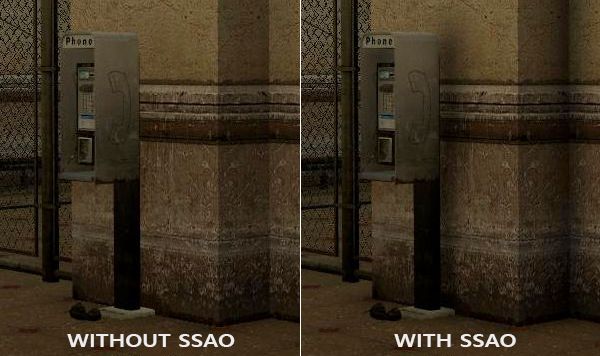
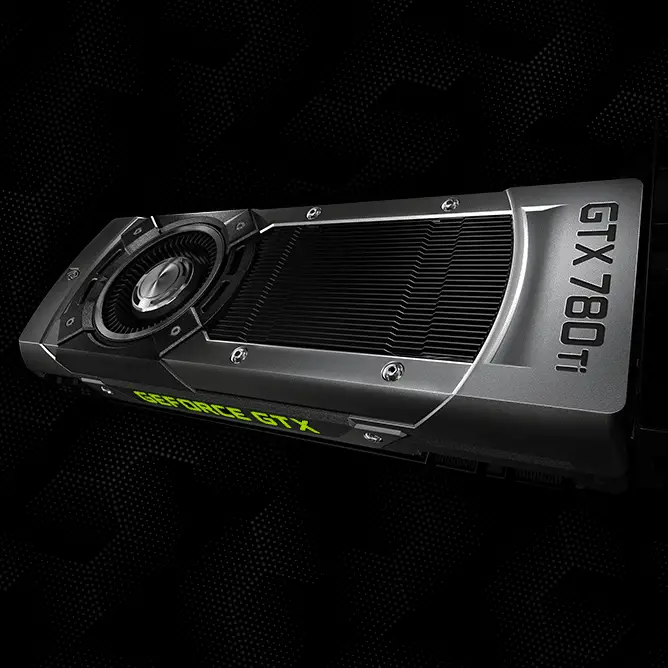
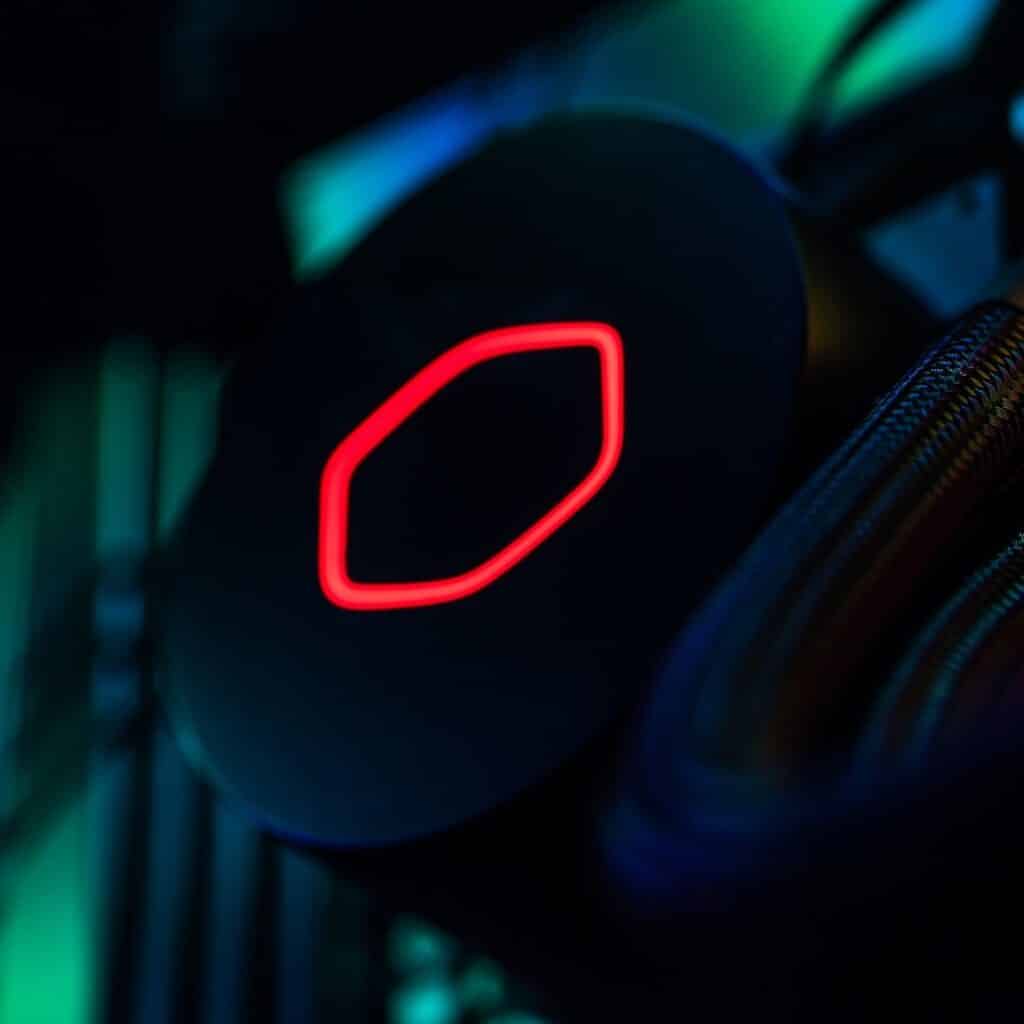
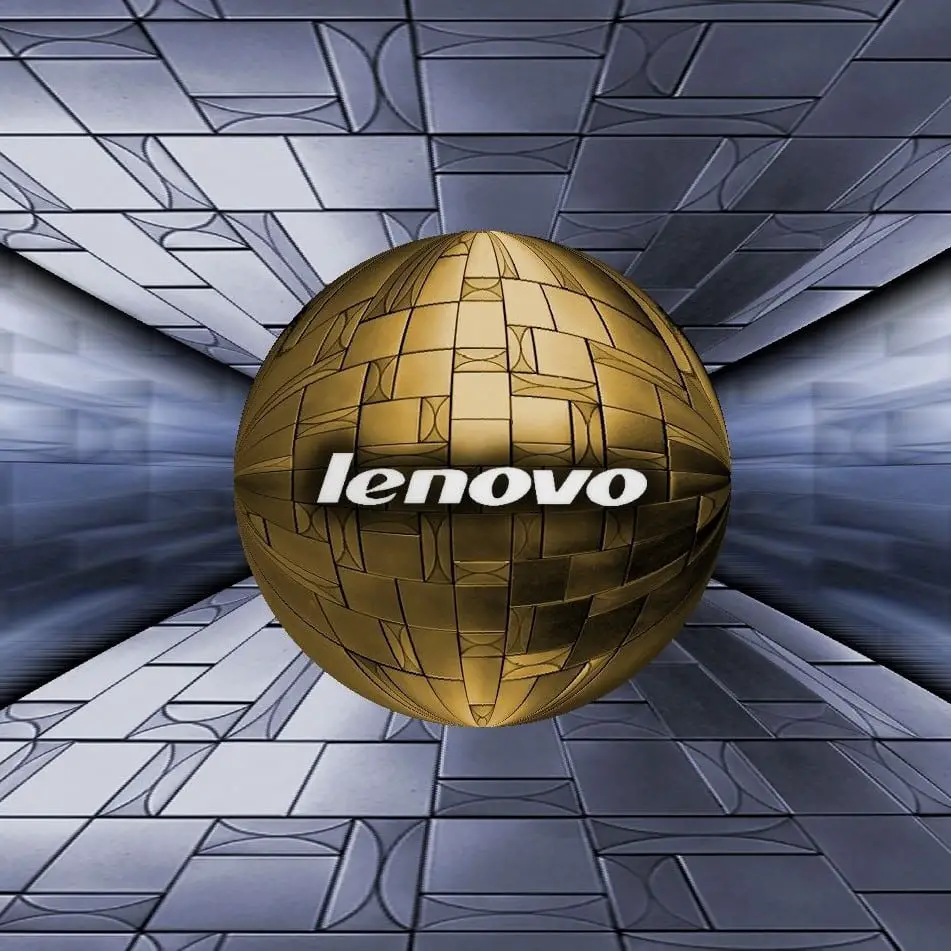
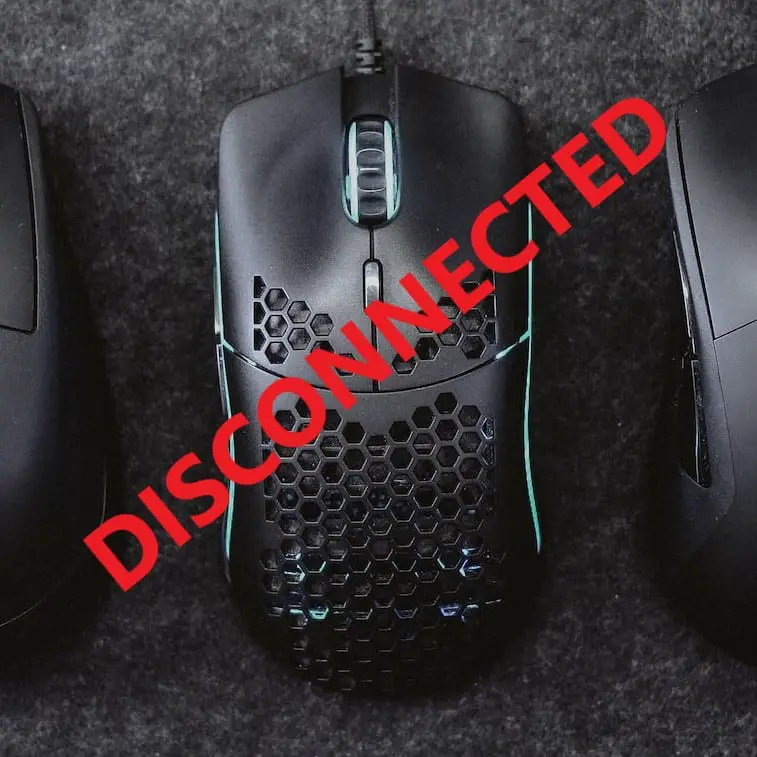
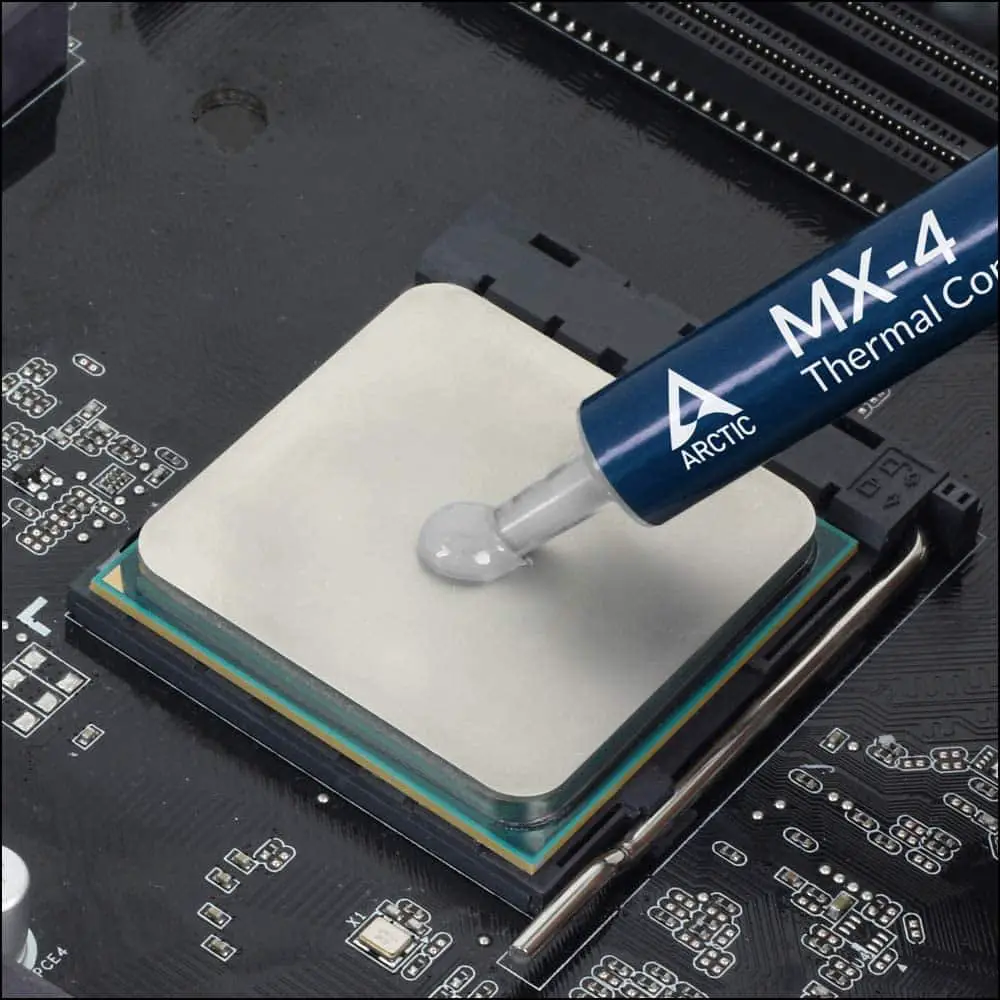
thank you.
you are truly an expert one